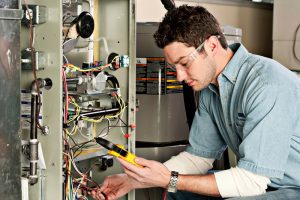Gas furnaces are a popular choice for heating homes, but some homeowners may have concerns about whether they’re safe to operate. So before we go any further, we want to assure you that gas furnaces are not inherently dangerous. With proper care and regular maintenance, they can safely keep your home warm for years.
We’ll discuss how gas furnaces operate safely, what can lead to potential dangers, and the precautions you can take to ensure your furnace continues to be a safe and effective heating solution. You can always depend on us for heater service in Glenwood, GA that will help you stay safe with your furnace.
Gas Furnaces Are Designed for Safety
Modern gas furnaces are built with a variety of safety features to protect homeowners. These systems are designed to combust natural gas efficiently, with exhaust systems that direct harmful gases like carbon monoxide (CO) safely outside your home. Features like flame sensors, pressure switches, and high-limit switches are in place to monitor the furnace’s operation and shut it down if anything goes wrong.
If your furnace is relatively new and professionally installed, there’s little need to worry about it being dangerous. Issues typically arise only when maintenance is neglected, or the system develops problems over time.
When Can a Gas Furnace Become Dangerous?
Here are some situations to watch for:
Cracked Heat Exchanger
The heat exchanger is a critical component of your furnace that separates combustion gases from the air that heats your home. Over time, wear and tear can cause it to crack. A cracked heat exchanger may allow dangerous gases like carbon monoxide to leak into your home, posing a serious health risk.
Blocked Ventilation
Your furnace’s exhaust vent is responsible for expelling combustion byproducts outside. If this vent becomes blocked by debris, snow, or animal nests, harmful gases can back up into your home.
Poor Combustion
An improperly tuned furnace may not burn gas completely, resulting in higher emissions of carbon monoxide. Poor combustion can occur if the burners are dirty or if the air-to-fuel ratio is off.
Delayed Repairs
Ignoring small problems with your furnace, such as strange noises or uneven heating, can lead to larger issues that affect the system’s safety.
Lack of Regular Maintenance
Routine maintenance is essential for identifying and fixing potential hazards before they become serious. Without annual inspections, you may not notice developing issues like worn-out parts, dirty burners, or failing safety switches.
Trust Premier Heating & Air for Furnace Safety
Gas furnaces are a dependable heating option, and with proper care, they can operate safely for many years. If you have any concerns about your furnace or want to schedule a maintenance visit, we’re here to help. The best way to start with furnace safety is to arrange for maintenance with our team if you haven’t already done it in the fall. Also, make sure to regularly change the furnace’s air filter regularly (every 1–3 months) and keep the area around it clear for about a foot.
With professional maintenance and a few simple precautions, you can enjoy the warmth and peace of mind that a well-maintained gas furnace provides.


